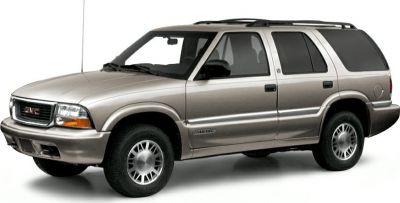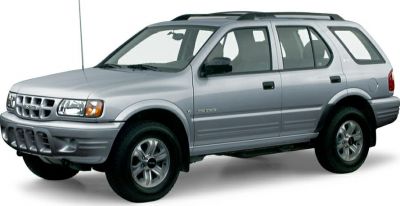 1999 Chevrolet Blazer II (2-door, facelift 1998) Dimensions, Size & Specs
1999 Chevrolet Blazer II (2-door, facelift 1998) Dimensions, Size & SpecsMeasurements of the 1999 Chevrolet Blazer II, engineered for optimal performance and comfort
| Dimensions | |
|---|---|
| Length: | 4491 mm176.8 in14.7 ft |
| Width: | 1722 mm67.8 in5.6 ft |
| Height: | 1638-1648 mm64.5-64.9 in5.4-5.4 ft |
| Trunk Capacity (Max): | 1716 liter60.6 cu ft |
| Weight Specifications | |
| Maximal permitted Weight: | 2200 kg4850 lbs |
| Roof Load: | 91 kg201 lbs |
| Tire Specifications | |
| Rims Sizes: | 15-inch rims:
|
| Tire Sizes: |
|
The Chevrolet Blazer II (facelift 1998) is a robust 2-door SUV that was produced from 1998 to 2005, with the 1999 model year representing its continued production phase under this generation. Designed primarily as a mid-sized sport utility vehicle, the Blazer II offers a practical balance of size and utility, making it a popular choice for both everyday driving and light off-road adventures.
In terms of dimensions, this Blazer measures 4491 mm (176.7 inches) in length, 1722 mm (67.8 inches) in width, and boasts a variable height ranging between 1638 and 1648 mm (64.5 to 64.9 inches). These compact yet sturdy proportions ensure maneuverability while still providing ample interior space.
The maximum weight of the vehicle reaches up to 2200 kg (4850 lbs), reflecting its solid build and capability to handle various terrains and cargo loads. Speaking of cargo, the vehicle impresses with a generous luggage capacity of 1716 liters (60.6 cubic feet) with the rear seats folded down, emphasizing its versatility for hauling large items or accommodating outdoor gear.
Riding on rims sized between 7J x 15 and 8J x 16, the Blazer supports tire sizes of 235/70 R15, 235/75 R15, and 235/60 R16, offering a balance between traction and ride comfort. Additionally, the roof load capacity is rated at 91 kg (200 lbs), suitable for carrying rooftop carriers or sports equipment.
This iteration of the Chevrolet Blazer II stands out as a reliable SUV with balanced dimensions tailored for both urban and rugged use. Its notable cargo space and roof load capability enhance its appeal among drivers who need flexibility without sacrificing performance. Overall, the Chevrolet Blazer II continues to be a respected model in the SUV segment from the late 1990s to mid-2000s.
Discover the standout features that make the 1999 Chevrolet Blazer II a leader in its class
Have a question? Please check our knowledgebase first.
The 1999 Chevrolet Blazer II 2-door facelift measures 4491 mm (176.7 inches) in length, 1722 mm (67.8 inches) in width, and has a height ranging between 1638 mm to 1648 mm (64.5 to 64.9 inches). These dimensions contribute to its compact SUV profile, making it maneuverable yet spacious enough for a family SUV.
The maximum weight capacity, also known as the gross vehicle weight rating (GVWR), of the 1999 Chevrolet Blazer II 2-door facelift is 2200 kilograms (approximately 4850 pounds). This weight includes the vehicle's weight plus passengers, cargo, fuel, and any extra equipment, ensuring safe and reliable operation within designed limits.
With the rear seats folded down, the 1999 Chevrolet Blazer II 2-door facelift offers a generous luggage capacity of 1716 liters (about 60.6 cubic feet). This spacious cargo volume allows for carrying large amounts of gear, making it practical for road trips or transporting large items.
The roof load capacity of the 1999 Chevrolet Blazer II 2-door facelift is rated at 91 kilograms (200 pounds). This indicates the maximum safe weight that can be placed on the roof racks or roof rails of the vehicle, suitable for carrying luggage carriers, roof boxes, bicycles or other equipment without compromising vehicle stability or safety.
The 1999 Chevrolet Blazer II 2-door facelift typically uses rims sized 7J x 15, 8J x 15, and 8J x 16 inches. Compatible tire sizes include 235/70 R15, 235/75 R15, and 235/60 R16. These specifications ensure proper fitment and maintain vehicle performance and handling characteristics.
Yes, the 1999 Chevrolet Blazer II 2-door facelift usually fits into a standard residential garage. Given its dimensions—4491 mm (176.7 inches) long, 1722 mm (67.8 inches) wide, and up to 1648 mm (64.9 inches) tall—it comfortably fits within typical garage dimensions which usually accommodate vehicles up to around 6 meters (236 inches) long and 2.5 meters (98 inches) wide. However, garage door clearance and interior height should be checked, especially if aftermarket roof accessories are installed.
Compared to its predecessor, the 1999 Chevrolet Blazer II 2-door facelift saw subtle refinements in styling and dimensions to improve interior space and road presence while retaining a similar footprint. The overall length of about 4491 mm (176.7 inches) and width of 1722 mm (67.8 inches) placed it in the compact SUV segment, maintaining easy maneuverability but offering enhanced cargo and cabin capacity. The facelift also introduced refreshed exterior aesthetics and minor suspension tweaks, aligning it closer to consumer expectations during the late 1990s.
When compared to similar compact SUVs from the late 1990s and early 2000s—such as the Ford Explorer, Jeep Cherokee, and Toyota RAV4—the 1999 Chevrolet Blazer II 2-door facelift holds its own in terms of size and practicality. While it is slightly smaller in width than some rivals, its cargo space of 1716 liters (60.6 cubic feet) with rear seats folded is very competitive, offering excellent utility. The Blazer's 2200 kg (4850 lbs) maximum weight capacity supports robust performance, and its 2-door layout makes it somewhat sportier but slightly less convenient when it comes to rear passenger access compared to 4-door competitors.
The height range of 1638 mm to 1648 mm (about 64.5 to 64.9 inches) for the 1999 Chevrolet Blazer II 2-door facelift can vary slightly based on factors such as suspension setup, tire size, and optional equipment like roof rails. This height provides a balanced SUV stance offering good road visibility and ease of entry while ensuring aerodynamic efficiency. The moderate height also allows it to remain practical for most parking structures and home garages.
Key exterior dimension-related considerations for the 1999 Chevrolet Blazer II include its length of 4491 mm (176.7 inches), which is compact enough for urban maneuvering and parking, and its width of 1722 mm (67.8 inches), which helps narrow-lane navigation and fitting into tight parking spaces. The vehicle's height, up to 1648 mm (64.9 inches), is moderate and unlikely to restrict entry into parking garages under regulation clearance heights. The relatively moderate size contributes to easier handling in city traffic and off-road conditions typical for SUVs.
Discover similar sized cars.

| Production: | 1994-2001 |
|---|---|
| Model Year: | 1995 |
| Length: | 4503 mm177.3 in |
| Width: | 1722 mm67.8 in |
| Height: | 1648 mm64.9 in |

| Production: | 1993-1997 |
|---|---|
| Model Year: | 1993 |
| Length: | 4480 mm176.4 in |
| Width: | 1690 mm66.5 in |
| Height: | 1660 mm65.4 in |

| Production: | 1994-1998 |
|---|---|
| Model Year: | 1995 |
| Length: | 4420-4602 mm174.0-181.2 in |
| Width: | 1661-1772 mm65.4-69.8 in |
| Height: | 1593-1702 mm62.7-67.0 in |

| Production: | 1989-2000 |
|---|---|
| Model Year: | 1990 |
| Length: | 4480 mm176.4 in |
| Width: | 1690 mm66.5 in |
| Height: | 1660 mm65.4 in |
